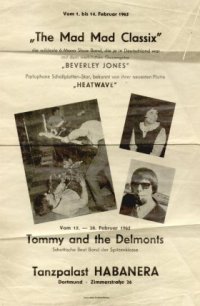 |
The public singing debut of Beverley Jones took place at the Electric Light Club in Alderman's Green, Coventry. She was just 4-years-old. To encourage his reluctant daughter to sing that night, her father promised to buy her something special as a reward. So Beverley got up and performed an old song entitled 'Little Mister Baggy Britches'. Dad bought Beverley a blue plastic handbag the next day. Within a decade she had become something of a local celebrity, known as Coventry's answer to Brenda Lee. Mick Patrick met up with her recently and captured her story for posterity.
My father was a self-taught pianist and his brother was a drummer. They had a little combo. So from this high I was used to having music around. There was always a piano around. My mum could sing but she never did anything with it. She did have a nice voice, though.
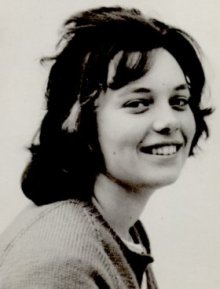 |
Me and my friend Carol began singing together, just clowning around in the playground at school, like you do. We used to do a lot of Everly Brothers songs. Our voices blended together well and I could harmonise. We ended up doing school concerts and things like that. We'd do purely Everly Brothers stuff. I ended up being pushed into entering a talent competition, just for a prank. This was at the Ritz Cinema in Radford, Coventry, which is ironic because my father used to manage it, but not at that time. It was a Sunday night. The film used to finish early and then there'd be a group on. It was the place where all the kids who were too young to drink went. In those days, you could go into any pub or club in Coventry and there'd be something going on all the time. All the local bands would be doing Cliff Richard songs. At this competition, they were all lads and they were all doing Cliff songs. I got up on stage and asked for 'Let's Jump The Broomstick'. The band had never heard of it. So I told them to just give me the beat with the drums and I'd just do it without any backing. That's what I did and I won the contest. I was 14-years-old.
The first group I ever joined was Johnny & the Rebels. After the talent show they came to my house and asked me to join. I didn't want to at first. But they were persistent and came back. I ended up as their lead singer. I found I enjoyed singing with the Rebels, so I decided to form a group of my own. I handpicked all the best musicians in town. We called the group Jackie Lane and the Three Jays. I was a Jones and there were two Johns in the group, Johnny Miles on lead guitar and Johnny Gibbons on bass. That's how we got the name. We had several different drummers. It was Nigel Lomas at one point. I changed my name to Jackie Lane because I didn't like Beverley Jones, my real name.
I used to sing with the band at the Craftsman pub in Radford on a Sunday. One of the punters there told me that he knew someone who would be interested in me. That someone turned out to be a guy named Denny Boyce. He had a band that played at the Streatham Locarno in London. He was also a manager and big friends with Kathy Kirby. A meeting was arranged. Denny said he'd like to hear me sing and that there was a talent show on. He told me to come down to London and do the show so he could get to hear what I could do. There was a recording contract for the winner. So I came down and did the show. In the audience was a friend of Denny's, a guy named Peter Sullivan. He was a great A & R man and went on to be Lulu's recording manager. Peter was impressed and the following week he gave me a recording test. So by the time the talent show final came around I'd already got the contract with Peter Sullivan. I won the final anyway.
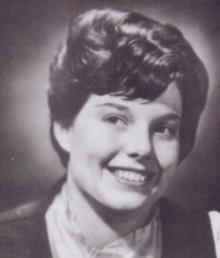 |
When I got my recording contract I couldn't be Jackie Lane because there was already someone in show business with that name. So I went back to being Beverley Jones. Unfortunately, my band didn't get to play on my records. It was the Harry Robinson Orchestra with the Mike Sammes Singers doing the vocal backing. Actually, I nearly turned down my contract out of loyalty to the band. When I came down to London for my recording test, the lads came with me. I wanted a contract for the whole group but EMI wouldn't have it. We were a band and I wanted to stick together. At first I refused to do it but the lads told me I should sign. They said my contract could lead to more work for them. So that's the reason I did it but I wanted it to be the four of us. I got to meet Clive Westlake at that session.
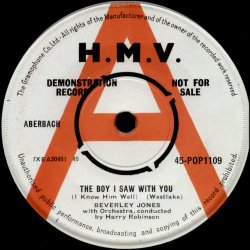
|
|
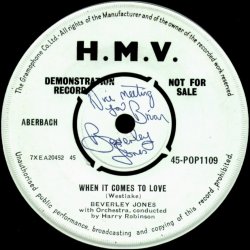 |
|
|
As a kid, Elvis Presley was my idol, and Brenda Lee. Yeah, I sounded a lot like her. Locally, I sang virtually everything Brenda Lee ever did. That's what packed the places, the likeness. But that was no good for recording, because there was already a Brenda Lee. When I cut my first disc, comparisons were made. So I had singing lessons to try and get rid of the husky sound. This went on for about six months. Freddie Winrose was my vocal coach. He also coached Shirley Bassey. Two or three times, when I went for my lessons, Carol Deene was there. I think Mr Winrose was her uncle, or something. She was nice, I liked her. At the end of the six months, my A & R man said, "Right, let's hear you". So I sang for him in his office and he said, "Well, you sound even more like Brenda Lee now than you did before. We may as well knock the singing lessons on the head".
Then Peter Sullivan left and moved to Decca. I really wanted to go with him but he'd already signed up Lulu and there was too much of a likeness between us. He couldn't have sold both of us to Decca. I feel now that I would have definitely been better off with him because my A & R man, a guy named Wally Ridley . . . well, from a 16-year-old's point of view, he seemed positively ancient. The guy was probably about 40. His ideas were dated. Ann Shelton, Alma Cogan and so forth - we're going back now - they were some of the acts he'd had on his books. The band and the Mike Sammes Singers . . . OK, they were great but how do you go out on stage and reproduce that sound? You can't. No, Wally Ridley's ideas were not my ideas at all but at 16 you don't really have the confidence to voice what you really want to do. I know I would have been better off with Peter Sullivan.
 |
Our gigs could range from a local pub to . . . well, there were Saturday nights where we would start off in a pub and do 45 minutes, then load everything into the van and do Finbarr's, an Irish pub. We'd do another set there, and then we'd pack up the gear again. It would be into the van to Birmingham where we'd do a nightclub. I could leave home at half past 6 in the evening and not get back home until 5 the next morning. The Flying Club was another big venue in Coventry. On one occasion we did an around the clock thing. There were six bands playing. It was continuous music, non-stop through the night. At the end of the night the bands cooked breakfast for all the punters that remained. I remember crawling into bed at about 9 on Sunday morning. By 5 my band were outside in the van waiting for me to get up so we could all go to the pictures. It was lovely, a great life. My mates were my band. I didn't really have girly mates to go around with.
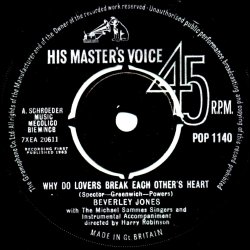 |
|
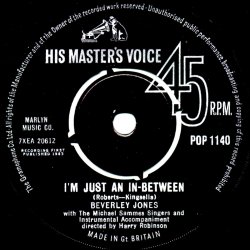 |
|
|
I did some TV and radio to promote the records. Every Friday night on Radio Luxemburg there was a show introduced by Shaw Taylor and Muriel Young. We'd go down to London quite often, probably about once a month. They'd have a small audience, you'd go along, have a little interview, mime to your record. That was at EMI, at their studios in London. I did that quite a lot.
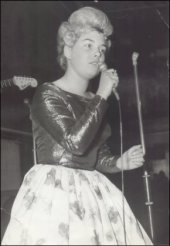 |
All of my singles were recorded in London. I used to travel down especially for the sessions. Everywhere I went, my parents came with me, at least one of them. I wouldn't go anywhere on my own and there was no way I would have moved away from home. That was my problem. I wanted to do it but I wanted to come back and still have a normal life, go out with my mates, be with my mum and dad, have my family around me. I think that's important. Even now, I think that's important to anyone coming into the music business. You need to keep your feet on the ground. Every time I went to London, before they took any photographs, they would send me off to the hairdressers. They ended up overdoing it with the old bleach and totally ruining my hair. There's a picture of me taken at the Locarno Ballroom in Coventry [see above] where I'm wearing a wig because half of my hair had broken off. I went back to my natural colour after that.
Usually, they'd give me a demo record to listen to and learn but with 'A Boy Like You' they sent me down the dots. I can't read music. My father was a pianist but dots - no! All of my mates were musicians. One of them was a guy named Johnny Goodison, a really big larger than life guy. He recorded as Johnny B. Great and was later in Brotherhood Of Man. It was a Saturday night and he was playing at the General Wolfe. I told him that I was recording the song on the Monday but had no idea how it went. So during his break I went up on the stage, showed him the dots and he played it for me. It was easy. All I had to do was learn the words. But when I got to the studio on the Monday, they played 'A Boy Like You' for me and it sounded like a completely different song to the one Johnny had played for me!
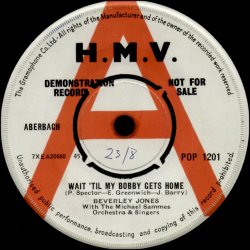 |
|
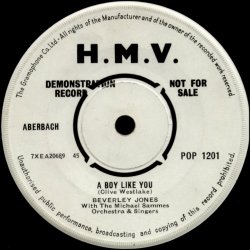 |
|
|
It was on another radio show that I worked with the Beatles. It was Easybeat, hosted by Brian Matthews. He was Coventry born. Clodagh Rodgers was on the show too. That was a good programme. I used to listen to it every week. You had to pass a BBC audition to go on. It was all very impersonal. I can remember doing it. You'd go in, just you and a pianist, and do one song. You'd be in one room and they'd be in another. There was just a microphone on a stand. You couldn't touch anything. You sang and they said, "Thank you". You didn't find out there and then if you'd passed. I did actually pass but you'd never have known from anyone's reaction.
The show was recorded at a theatre with a live audience. Afterwards, I went to the Beatles' dressing room to get their autographs, not for me but for my cousin's little girl who I used to collect autographs for. John Lennon invited me to come in and have coffee with them. He asked me where I came from. So I said, "Coventry. Where do you come from?" (Laughs)
It must have been late in '63 that I joined the Millionaires, another Coventry group. Ricky Dawson, their lead singer, was known as "The Duke", so I got nicknamed "The Duchess". I used to sing wearing a tiara (laughs). Then I decided to change my image. I felt I'd grown out of it. When I did live gigs, I stopped doing the Brenda Lee stuff and started throwing in songs by groups like the Stones and the Animals. The frilly dresses were never me, really. I wanted to be more like a female Mick Jagger, raunchy. I still do that. Years ago, they expected the Susan Maughans and the Helen Shapiros to come on and just stand there with never a hair out of place. That wasn't my way of working. So it was difficult until I got that bit older.
 |
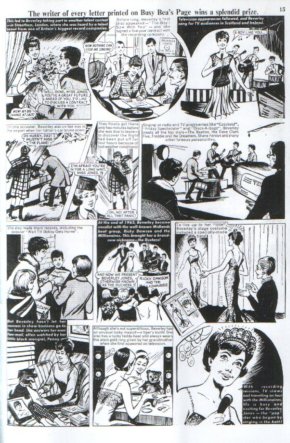 |
|
Beverley Jones Growing Up comic strip story from Judy, August 1964. [click on image for larger view] |
|
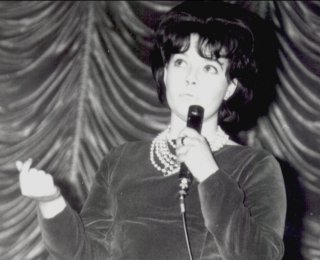 |
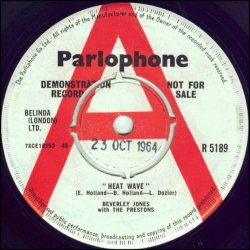 |
|
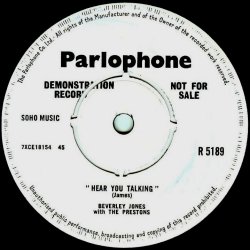 |
|
|
The Prestons were a London-based band but I don't know very much about them because all I ever did with them was the one record. We did meet up prior to going into the studio, to go through 'Heat Wave'. I wanted to do a slower song because up to that point my records had all been rinky-dink. One of the Prestons wrote 'Hear You Talking' for me. He'd begun the song and I really liked it, so he finished it for me. It's my favourite of all my records because it's the one I was really able to get my teeth into.
[click on image for larger view] |
Then I joined the Mad Classix. They needed a girl singer to front the band and I decided to do it. It wasn't the best career move I ever made because while I was away in Germany with the guys 'Heat Wave' wasn't getting promoted. But, having said that, I was glad I did it. It was good experience. We went out there in a dirty old van driven by our lead guitarist, Ron. We left Coventry on the morning of New Years Day 1965. It was the morning of the following day before we got shown to our room. The living conditions were a bit rough to start with. I wanted to go home. I didn't want to be there. I wanted my mum and dad. I was cold and it was awful. The British had a very bad name and were treated like second-class citizens. But as time passed, as the management got to know us, we were invited to eat at their table for meals and allowed to use the shower rooms. So it was alright in the end but it could be rough. We ended up staying in Germany for six months, playing all over the country. We played some shows with one band that really stick in my mind, the Rattles. They were really good and as big in Germany as the Beatles were here.
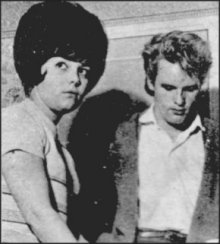 |
Beverley with husband-to-be |
In the February I had to come home because I got very homesick and my dad had got very stressed about his little girl being so far away from home. I was very much a daddy's girl. When I got up on the second day, there was a reporter sitting on the step. There had been rumours printed in the local press about me getting married. I hated that. Later, I did get married out there, to the lead-singer, Johnny Wells, who is my children's father. We got married in Dusseldorf. After I had my first child I didn't stop singing but I was only ever semi-professional. All I really wanted to be was a mum. That hasn't changed. My children are the most important things that ever happened in my life.
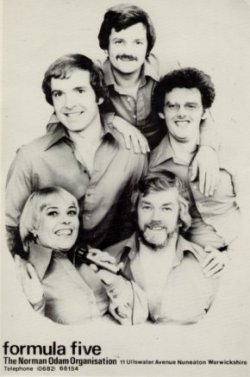 |
By 1976 I had joined Formula Five. Norman Odam was our manager and agent. He was a wonderful, lovely man. He looked after us. None of the group wanted to do it as a career because we all had other jobs. Noel, our lead guitarist, was a brilliant cartoonist. He works for a national newspaper now. I worked full-time as well. The group worked Friday and Saturday nights and sometimes another night. We landed a spot on New Faces. We went down for the audition and it was just horrendous. Just hanging around in corridors the whole day waiting to be heard. It was a three-day event. We did 'Sweet Nuthin's' and they said instantly that we could do the show. We were elated. But the whole thing turned out to be a set-up. Stella Starr had been brought in especially for the show. Of course she won it. Danny La Rue was on the panel. He liked us but the others weren't that impressed. But it was a good show and we were glad we did it. We looked upon it as free publicity on prime time television on a Saturday night. Our fees went up automatically.
Once you've been a performer, it gets in your blood. There's always gonna
be a time when you'll do it again. We always put on live entertainment
for our customers when we were in the pub business. We did that for about
ten years, all 'round the Midlands. These days I prefer life on the other
side of the bar. Now I work for the NHS at the local hospital. So do my
daughter Kerry and my son Darren. I never really stopped and I still perform
today, usually to raise funds for charity. If there's some money needs
to be raised, before I know it I'm up there on stage doing it again.
Illustrations supplied by Kerry Wood, Darren Wheldon, Ian Slater, Malcolm Baumgart, Mick Patrick and Ian Chapman
Click here for more images of Beverley
Beverley Jones' own website: http://beverleyjones.4t.com/index.html
Presented for Spectropop by Mick Patrick, Phil Chapman and Simon White
